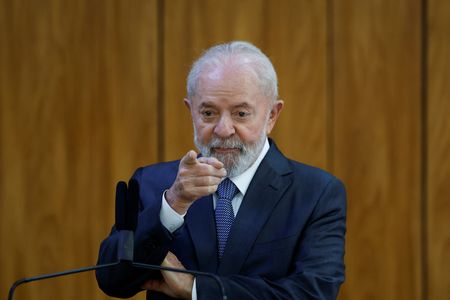By Marcela Ayres and Bernardo Caram
BRASILIA (Reuters) – Senior officials in Brazil’s economic team are signaling a need to curb pension spending in order to shore up public accounts, although their biggest challenge may be convincing President Luiz Inacio Lula da Silva to take such a measure.
Despite a sweeping 2019 pension reform, spending on retirements and pension benefits continues to surge, affected by an aging population and Lula’s policy of boosting benefits by more than inflation.
Treasury Secretary Rogerio Ceron said last week that pension expenses “still deserve attention” and may require “measures that allow the dynamics of this expenditure to have growth compatible with medium- and long-term fiscal sustainability.”
Latest Treasury data show that in the 12 months through March, the pension deficit, including civil servants and military service members, reached 4% of gross domestic product (GDP) in Latin America’s largest economy.
Planning Minister Simone Tebet said in an interview with Valor Economico published on Monday that she is discussing proposals that include unlinking pensions and social benefits from a policy of real increases to the minimum wage.
“We will have to do this out of conviction or out of necessity,” Tebet said, according to the interview. “I have to prepare the menu of adjustments for President Lula to decide if and when he can move it forward,” she added, emphasizing that the final word will come from the president.
Previous governments have considered and backed away from such proposals, which have long faced resistance from Lula’s leftist Workers Party. However, officials have become increasingly vocal about their concerns on pension expenses.
Adding to the momentum, Finance Minister Fernando Haddad on Thursday made a recommendation on social media of an article by economist Braulio Borges advocating fiscal adjustment through both higher revenue and expenditure cuts, calling the unlinking of the pension floor from the minimum wage a “crucial element.”
Borges argued that the minimum wage should be adjusted in real terms to reflect labor productivity gains but retirements and pensions should only maintain their purchasing power over time.
Such changes may be a hard sell for Lula, who recently told a closed-door meeting with advisors that the current policy of real gains for the minimum wage should be upheld at the expense of all others, according to a member of the economic team.
After years of no real gains, Lula passed a law in 2023 establishing that annual minimum wage adjustments should consider inflation measured by the INPC index in the previous 12 months plus the GDP expansion rate from two years before.
The same government source, who requested anonymity to discuss the sensitive topic, said it is still unclear how Lula would respond to the idea of unlinking of pensions from the minimum wage.
Over 60% of pension beneficiaries earn the minimum wage and directly benefit from the current correction system, making it a thorny issue for the president and his leftist base.
Above the minimum wage, pensions have been updated only by inflation for years.
Lula, meanwhile, reinforced last week a campaign promise with strong fiscal impact to increase, by the end of his term, the income tax exemption for workers earning up to 5,000 reais ($986), compared with the current exemption up to 2,824 reais, equivalent to two minimum wages per month.
($1 = 5.0698 reais)
(Reporting by Marcela Ayres and Bernardo Caram; Editing by Brad Haynes and Marguerita Choy)
Brought to you by www.srnnews.com







